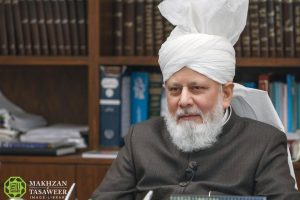
Adam Abid-Alexander, Canada
The world we live in presents such struggles that seem so overwhelming. It leaves one at a loss, as to how they can navigate life in the midst of this complicated world. Life would truly be much easier if there was some sort of guide which every person was handed, explaining how to manoeuvre and deal with life.
Muslims believe that this coveted guidebook already exists; it is the ultimate guide, code of conduct and way of life; the true path of salvation. This of course is none other than the holy scripture of Islam, the revealed, unaltered Word of God, the Holy Qur’an. It is in the Holy Qur’an that billions in the world find answers to every matter, big or small.
It is in fact, in realising the importance of reading the Holy Qur’an and establishing communion with God that we can attain a path to salvation. Until we realize that Allah Alone is our Helper and there is no other Helper besides Him, we cannot begin to progress and improve ourselves. The Holy Qur’an has been sent down to us as a mercy from Allah, to relieve and grant comfort to those that have searched for God everywhere, only to be broken-hearted.
‘O mankind! There has come to you an exhortation from your Lord and a cure for whatever disease there is in the hearts, and a guidance and a mercy to the believers.’ [1]

The Second Caliph of the Ahmadiyya Muslim Community, Hazrat Mirza Bashiruddin Mahmud Ahmad (ra) writes in his commentary of this verse:
‘The verse sheds some light on the secret of the Holy Prophet’s phenomenal success. It tells us that it was not due to vast armies, great riches or large numbers of followers, but to this excellent Book, the Qur’an, whose teaching cannot long be resisted and to which sooner or later man is bound to turn for guidance, for it is an “exhortation from your Lord” and a “cure for whatever disease there is in the hearts” as well as a “guidance and a mercy.”
The Qur’an is موعظة (an exhortation), for: (a) it contains teachings which proceed from a genuine desire to impart good counsel, and when people see that the Prophet seeks no personal aggrandizement by promulgating these teachings but only their own good and their own welfare, they will not fail to be attracted to it; (b) the Qur’anic teaching is calculated to deeply affect and touch the human heart, and it lays so much stress on the love and fear of God that even the most hard-hearted man cannot remain unaffected by it; and (c) it has set forth in a beautiful manner all those principles and rules of conduct which lead to reformation and success.
The Qur’an, as the verse tells us, is also شفاء (cure) for all spiritual diseases and maladies. No matter how low a man may fall, there continues to arise in his mind a yearning for truth, a desire to know the reality of things; and it is when his mind is distracted by doubts and misgivings and he seeks satisfaction on questions concerning spiritual matters that the Qur’an comes to his rescue and dispels all his doubts, with the result that he becomes irresistibly drawn to it.’ [2]

This blessed exhortation of Allah came when darkness had reached a limit that dictated that light should once again shine. Just as the night reaches a limit to which the light of dawn should re-emerge and the bright day should lustre forth.
Just as it does in the world we live in, the cycle of night and day exists in the body and mind of each one of us. We experience the rise and fall of faith; we bear loss with a heavy heart and strive again with great strength for the spiritual tranquility we once felt.
The Promised Messiah and Founder of the Ahmadiyya Muslim Community, Hazrat Mirza Ghulam Ahmad (as) writes regarding the internal struggle and battle of night and day in the following words:
‘It is the law of nature that when a man is overpowered by some carnal desire or is subjected to a spiritual calamity—for instance, when his anger is fuelled, or his sexual desires are aroused, or he runs into some trouble, or he is in mourning, or is stricken with grief and a painful situation, or has been overcome by some carnal or spiritual disturbance—he cannot cure his maladies and motives that have taken control over both his mind and soul, merely through his self-admonition and advice. Rather, to remove such passions he is in need of a counsellor who commands the respect of the listener, is venerable, truthful in his speech, perfect in his knowledge, and trustworthy of fulfilling his promises; and furthermore, has the power to achieve that which inspires awe, hope, or comfort in the listener’s heart. For, it is manifestly evident and obvious that man often finds himself in a situation where, although he really considers a sin to be a sin or regards an action that is incompatible with steadfastness and patience to be contrary to steadfastness, yet the veil of negligence or the shock of sudden grief afflicts his heart. That veil is removed only when some other person, whose greatness, reverence, and truthfulness is established in his heart, admonishes him and urges him to do good or warns him, or comforts or satisfies him, in accordance with the situation.’ [3]

The miraculous preservation of the Holy Qur’an was necessitated by the human mind and heart needing some degree of certainty before throwing itself at the behest of God. In no other religion does there dwell such an assurance of the existence of God or an unadulterated Holy scripture.
Therefore, at this moment when the world has found itself not only stricken with a viral pandemic, but we are also being overcome by the mental side effects of living in fear and isolation, we have all felt an unfamiliar pain; some more than others.
This confusion and uncertainty that has come about during this pandemic is definitely something that we were not prepared for. With enormous empathy and love, the Promised Messiah (as) reminds us during these periods of serve trial and tribulation that we have in our possession the treatment.
‘If someone faces a disaster or is mourning the loss of a life, although he is aware that this world is not a place of permanent happiness and peace, nor is it everlasting, times of shock, grief, and anxiety overwhelm the helpless man and his heart is totally beyond his control. In this situation, if such a person—who, in his opinion, is exceedingly holy, saintly, and venerable—admonishes him to be patient because there are great rewards with God for those who are patient, and that this world is not a place of eternal life—even though he already knew it—hearing this from his mouth impacts him with such a wonderful effect that it prevents him from falling.’ [4]
Indeed, the pure and Holy One who is admonishing you is Allah Himself. The Holy Qur’an has been called the الذِّکۡرَ (The Reminder) and therein are found the pure unblemished words of God.
‘And all of the tidings of the Messengers, whereby We make thy heart firm, We relate unto thee. And herein has come to thee the truth and an exhortation and a reminder for believers.’ [5]
The Promised Messiah (as) as described the supremacy of this reminder so beautifully, ‘When a person believes wholeheartedly in the Word of God and there is no intervention of any overt or covert aversion, the Word of God saves him from fierce whirlpools, fights off intense carnal passions, and affords him patience during the most terrifying calamities. When a person desires to turn to God, hundreds of impediments block his attention—sometimes the pleasures of this world come to his mind, sometimes the company of his close friends pulls at his cloak, and sometimes he is intimidated by the difficulties of this path. Sometimes old habits and prevailing customs become his stumbling blocks and sometimes honour, fame, authority, or power try to obstruct him from this path,..on the occasion of such a battle, the powerful guns of God’s Word are needed to disperse the enemy lines by the firing of just a single shot.’ [6]
It is when we are missing the revelation from God and the personal experience that we find ourselves deficient of faith. Consequently, disbelief and doubts trail this lack of experience and connection with the Word of God and so the Promised Messiah (as) has expressed pity to such a plummet of faith. [7]

So, when at this stage and in this state, on should not turn away from the only remedy for mental fatigue and despair. Rather, one should look to the Holy Qur’an as a beacon calling towards the renewal of self, enabling one to reach the full potential the lies within.
The Holy Qur’an is truly the answer to broken, distressed and wandering hearts and distress. To move away from it would only increase one’s despair. The Promised Messiah (as) states:
‘So, if you desire to be an atheist, do as you please; otherwise, the only way you can be delivered from the fierce flood of doubts—which has swept thousands of intellectuals far superior to you into the depth of degradation with a single surge—is to take a firm hold of the strong handle of true revelation’. [8]
There can be no greater pursuit in the quest for happiness than to read and study the Holy Qur’an for Allah has said ‘Those who believe, and whose hearts find comfort in the remembrance of Allah. Aye! It is in the remembrance of Allah that hearts can find comfort.’ [9]
Hazrat Mirza Bashiruddin Mahmud Ahmad (ra) explains:
‘This beautiful verse embodies a great and extremely natural truth. The more the people of the world gain the paltry goods of this life, the greater becomes the hunger and the consequent burning of their heart. But as for those who seek God, the more they turn to Him, the greater is their peace of mind. This shows that search after God is the innermost yearning of human nature and the real goal of man’s life, and that when that goal is attained man begins to enjoy perfect peace of mind, for then he rests, as it were, in the very lap of the All-Knowing and All-Powerful God, Maker and Controller of the universe. Would the people of the world had realized this great secret of happiness.’ [10]
In the end I pray for all in the following words of the Holy Qur’an:
‘Our Lord, let not our hearts become perverse after You have guided us; and bestow upon us mercy from Yourself, surely You alone are the Bestower.’[11]
About the Author: Adam Abid Alexander accepted Islam Ahmadiyyat in 2008. He now serves as an Imam of the Ahmadiyya Muslim Community in Canada.
ENDNOTES
[1] The Holy Qur’an 10:58
[2] The Holy Qur’an with English Translation and Commentary, Hazrat Mirza Bashiruddin Mahmud Ahmad (ra) Vol. 3 p. 1266
[3] Barahin-e-Ahmadiyya Part 4 pp. 81-82
[4] Ibid p. 83
[5] The Holy Qur’an 11:121
[6] Barahin-e-Ahmadiyya Part 4 p. 84
[7] Ibid p. 88
[8] Ibid p. 89
[9] The Holy Qur’an 13:29
[10] The Holy Qur’an with English Translation and Commentary, Hazrat Mirza Bashiruddin Mahmud Ahmad (ra) Vol. 3 p. 1266
[11] The Holy Qur’an 3:9




Add Comment